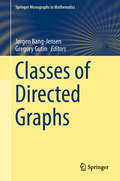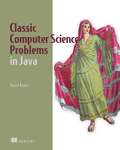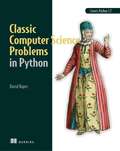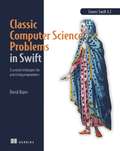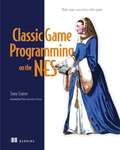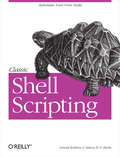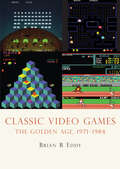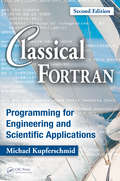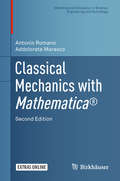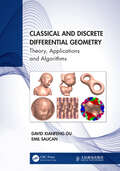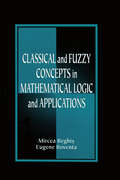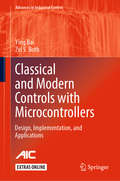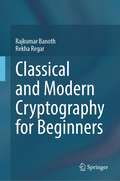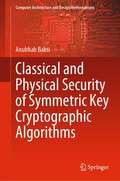- Table View
- List View
Civic Space / Cyberspace: The American Public Library in the Information Age
by Redmond Kathleen Molz Phyllis DainQuintessentially American institutions, symbols of community spirit and the American faith in education, public libraries are ubiquitous in the United States. Close to a billion library visits are made each year, and more children join summer reading programs than little league baseball.
Civil Society and the Internet in Japan (Routledge Contemporary Japan Series)
by Isa DuckeUsing case studies, interviews, and empirical sources, this book analyzes the strategies and impact of Internet use by civil society actors and asks how useful it is for their work – does the availability of Internet tools change the way citizens’ groups work, does it influence their effectiveness, and does it do so differently in Japan from other countries? Four fascinating studies take a closer look at the role of the Internet during the history textbook controversy; strategies of small citizen's groups; comparisons between internet use in Japan, Korea and Germany; and how the internet is used as a platform to discuss the dispatch of Japanese troops in Iraq. Isa Ducke has produced an original work that will be of interest to students and scholars of Japanese politics, media and information technology and civil society.
Claim Me: Book 2: Stark Trilogy (Stark Series #4)
by J. KennerFor fans of Fifty Shades of Grey and the Crossfire series. In Release Me, powerful multimillionaire Damien Stark made Southern belle Nikki Fairchild an unforgettable indecent proposal which she couldn't resist. Now their sensual, erotic, powerfully emotional romance continues in Claim Me, the next in J. Kenner's New York Times bestselling series.For Damien, our obsession is a game. For me, it is fiercely, blindingly, real.Damien Stark's need is palpable - his need for pleasure, his need for control, his need for me. Beautiful and brilliant yet tortured at his core, he is in every way my match. I have agreed to be his alone, and now I want him to be fully mine. I want us to possess each other beyond the sweetest edge of our ecstasy, into the deepest desires of our souls. To let the fire that burns between us consume us both. But there are dark places within Damien that not even our wildest passion can touch. I yearn to know his secrets, yearn for him to surrender to me as I have surrendered to him. But our troubled pasts will either bind us close...or shatter us completely.Spellbinding romance. Electrifying passion. Why not indulge in J. Kenner...Discover the whole story of Damien and Nikki's epic romance in J. Kenner's hot and addictive bestselling Stark series: Release Me, Claim Me, Complete Me, Take Me, Have Me, Play My Game, Seduce Me, Unwrap Me, Deepest Kiss, Entice Me and Anchor Me.(P)2013 Headline Digital
Claim Me: The Stark Series #2 (Stark Series #4)
by J. KennerFor fans of Fifty Shades of Grey and the Crossfire series. In Release Me, powerful multimillionaire Damien Stark made Southern belle Nikki Fairchild an unforgettable indecent proposal which she couldn't resist. Now their sensual, erotic, powerfully emotional romance continues in Claim Me, the next in J. Kenner's New York Times bestselling series.For Damien, our obsession is a game. For me, it is fiercely, blindingly, real.Damien Stark's need is palpable - his need for pleasure, his need for control, his need for me. Beautiful and brilliant yet tortured at his core, he is in every way my match. I have agreed to be his alone, and now I want him to be fully mine. I want us to possess each other beyond the sweetest edge of our ecstasy, into the deepest desires of our souls. To let the fire that burns between us consume us both. But there are dark places within Damien that not even our wildest passion can touch. I yearn to know his secrets, yearn for him to surrender to me as I have surrendered to him. But our troubled pasts will either bind us close...or shatter us completely.Spellbinding romance. Electrifying passion. Why not indulge in J. Kenner...Discover the whole story of Damien and Nikki's epic romance in J. Kenner's hot and addictive bestselling Stark series: Release Me, Claim Me, Complete Me, Take Me, Have Me, Play My Game, Seduce Me, Unwrap Me, Deepest Kiss, Entice Me and Anchor Me.
Clash At Fatal Fields: An Unofficial Fortnite Novel (Trapped In Battle Royale)
by Devin HunterTwelve-year-old Grey gets sucked into a hacked, virtual reality version of Fortnite Battle Royale along with one hundred other players. To get home, he must become one of the top five players before the season ends, or he’s stuck in Fortnite for another two months. <P><P>Grey logs into Battle Royale as usual, but unlike before he passes out and wakes up in the lobby and everything is as real as can be. Four others stand there with him as an admin tells them they are the “new meat” and their game has been hacked. Their consciousness will be trapped in this version of Fortnite until they can become the top five players for a season. <P><P>New to the fighting arena but ambitious, Grey sets out for glory with one hundred other players on a flying bus. As they jump and land on the island to battle, he struggles to figure out the tools as people come to kill him. He dies quickly, much to his disappointment. Maybe this won’t be as easy as he thought. <P><P>While waiting for the next game in the lobby, someone gives him some tips to help him out and he fares a bit better. They form a duo in hopes of both escaping the game together. Will Grey be able to escape, now that he has an ally?
Clash Royale: Guía no Oficial, Trucos, Consejos y Secretos
by Joshua Abbott Enrique Sánchez Peño*GUÍA NO OFICIAL* Guía Estratégica y Consejos Avanzados. Esta es la guía online más completa y detallada que encontrarás. Tras el éxito de mi centenar de guías y manuales, he escrito otra guía profesional avanzada para jugadores nuevos y veteranos, en la que incluyo estrategias específicas y consejos sobre cómo mejorar en el juego, vencer a tus oponentes, conseguir más monedas... ¡Y mucho más! - Consejos y Estrategias de Expertos. - Trucos y Atajos. - ¡Secretos, Consejos, Trucos, Contenido Desbloqueable y Estrategias Utilizadas Por Jugadores Profesionales! - Cómo Conseguir Gemas y Monedas. - ¡Y MUCHO MÁS! Todas las versiones de esta guía contienen capturas del juego para ayudarte a entenderlo mejor. No existe ninguna guía tan detallada y avanzada como esta. Aviso Legal: Este producto no está asociado, afiliado, aprobado, certificado o publicitado por el Titular Original de los Derechos de Autor.
Clash in the Underwater World: An Unofficial Overworld Heroes Adventure, Book Four (Unofficial Overworld Heroes Adventure #4)
by Danica DavidsonAfter their adventures in the Jungle Biome, Stevie and Alex have tracked down another shard of the mysterious Ender crystal, which they must reassemble in order to keep the Ender Dragon from spawning in their world.With the new shard in hand, another segment of Alex’s enchanted book becomes clear. Stevie and Alex are finally able to read the instructions for obtaining the next Ender crystal shard, and what they read amazes them. The book seems to want them to travel to a whole new biome—one that’s underwater!But first, the friends will have to learn potion-making skills and adapt to fighting mobs in the water. There isn’t much time, and the entire Overworld is depending on them. Can Stevie and Alex survive the unknown terrors of the underwater world in order to continue their quest to stop the terrifying Ender Dragon?Fans of Minecraft will be riveted the whole way through the fourth Unofficial Overworld Heroes Adventure!
Clash of Clans Spielführer
by Joshua Abbott Sabrina SchalzIntroduction Führe deinen Clan zum Sieg! Clash of Clans ist ein episches Kampf-Strategiespiel. Baue deine Stadt, trainiere deine Truppen und kämpfe mit tausenden von anderen Spielern online! Dieses Spiel von Supercell ist eins der beliebtesten Strategiespieleapps 2013. Im folgenden Buch haben wir die effektivsten Strategien, um deine Gegner zu besiegen und so gut zu spielen wie die Pros, aufgelistet!
Clash of Clans: Guida al gioco
by Joshua Abbott Ile. ZEcco cosa potrai scoprire quando acquisti questa guida professionale avanzata e dettagliata del gioco: - Consigli professionali e strategie. - Trucchi e Hacks. - Segreti, suggerimenti, trucchi, e trucchi utilizzati da giocatori Pro! - Come ottenere tonnellate di denaro contante / monete. - E molto altro ancora!
Classes of Directed Graphs (Springer Monographs in Mathematics)
by Jørgen Bang-Jensen Gregory GutinThis edited volume offers a detailed account of the theory of directed graphs from the perspective of important classes of digraphs, with each chapter written by experts on the topic. Outlining fundamental discoveries and new results obtained over recent years, this book provides a comprehensive overview of the latest research in the field. It covers core new results on each of the classes discussed, including chapters on tournaments, planar digraphs, acyclic digraphs, Euler digraphs, graph products, directed width parameters, and algorithms. Detailed indices ease navigation while more than 120 open problems and conjectures ensure that readers are immersed in all aspects of the field. Classes of Directed Graphs provides a valuable reference for graduate students and researchers in computer science, mathematics and operations research. As digraphs are an important modelling tool in other areas of research, this book will also be a useful resource to researchers working in bioinformatics, chemoinformatics, sociology, physics, medicine, etc.
Classic Computer Science Problems in Java
by David KopecSharpen your coding skills by exploring established computer science problems! Classic Computer Science Problems in Java challenges you with time-tested scenarios and algorithms.Summary Sharpen your coding skills by exploring established computer science problems! Classic Computer Science Problems in Java challenges you with time-tested scenarios and algorithms. You&’ll work through a series of exercises based in computer science fundamentals that are designed to improve your software development abilities, improve your understanding of artificial intelligence, and even prepare you to ace an interview. As you work through examples in search, clustering, graphs, and more, you'll remember important things you've forgotten and discover classic solutions to your "new" problems! Purchase of the print book includes a free eBook in PDF, Kindle, and ePub formats from Manning Publications. About the technology Whatever software development problem you&’re facing, odds are someone has already uncovered a solution. This book collects the most useful solutions devised, guiding you through a variety of challenges and tried-and-true problem-solving techniques. The principles and algorithms presented here are guaranteed to save you countless hours in project after project. About the book Classic Computer Science Problems in Java is a master class in computer programming designed around 55 exercises that have been used in computer science classrooms for years. You&’ll work through hands-on examples as you explore core algorithms, constraint problems, AI applications, and much more. What's inside Recursion, memoization, and bit manipulation Search, graph, and genetic algorithms Constraint-satisfaction problems K-means clustering, neural networks, and adversarial search About the reader For intermediate Java programmers. About the author David Kopec is an assistant professor of Computer Science and Innovation at Champlain College in Burlington, Vermont. Table of Contents 1 Small problems 2 Search problems 3 Constraint-satisfaction problems 4 Graph problems 5 Genetic algorithms 6 K-means clustering 7 Fairly simple neural networks 8 Adversarial search 9 Miscellaneous problems 10 Interview with Brian Goetz
Classic Computer Science Problems in Python
by David Kopec&”Highly recommended to everyone interested in deepening their understanding of Python and practical computer science.&” —Daniel Kenney-Jung, MD, University of Minnesota Key Features Master formal techniques taught in college computer science classes Connect computer science theory to real-world applications, data, and performance Prepare for programmer interviews Recognize the core ideas behind most &“new&” challenges Covers Python 3.7 Purchase of the print book includes a free eBook in PDF, Kindle, and ePub formats from Manning Publications. About The Book Programming problems that seem new or unique are usually rooted in well-known engineering principles. Classic Computer Science Problems in Python guides you through time-tested scenarios, exercises, and algorithms that will prepare you for the &“new&” problems you&’ll face when you start your next project. In this amazing book, you'll tackle dozens of coding challenges, ranging from simple tasks like binary search algorithms to clustering data using k-means. As you work through examples for web development, machine learning, and more, you'll remember important things you've forgotten and discover classic solutions that will save you hours of time. What You Will Learn Search algorithms Common techniques for graphs Neural networks Genetic algorithms Adversarial search Uses type hints throughout This Book Is Written For For intermediate Python programmers. About The Author David Kopec is an assistant professor of Computer Science and Innovation at Champlain College in Burlington, Vermont. He is the author of Dart for Absolute Beginners (Apress, 2014), Classic Computer Science Problems in Swift (Manning, 2018), and Classic Computer Science Problems in Java (Manning, 2020) Table of Contents Small problems Search problems Constraint-satisfaction problems Graph problems Genetic algorithms K-means clustering Fairly simple neural networks Adversarial search Miscellaneous problems
Classic Computer Science Problems in Swift: Essential techniques for practicing programmers
by David Kopec Ivan MartinovicSummaryClassic Computer Science Problems in Swift invites readers to invest their energy in some foundational techniques that have been proven to stand the test of time. Along the way they'll learn intermediate and advanced features of the Swift programming language, a worthwhile skill in its own right.Purchase of the print book includes a free eBook in PDF, Kindle, and ePub formats from Manning Publications.About the TechnologyDon't just learn another language. Become a better programmer instead. Today's awesome iOS apps stand on the shoulders of classic algorithms, coding techniques, and engineering principles. Master these core skills in Swift, and you'll be ready for AI, data-centric programming, machine learning, and the other development challenges that will define the next decade.About the BookClassic Computer Science Problems in Swift deepens your Swift language skills by exploring foundational coding techniques and algorithms. As you work through examples in search, clustering, graphs, and more, you'll remember important things you've forgotten and discover classic solutions to your "new" problems. You'll appreciate author David Kopec's amazing ability to connect the core disciplines of computer science to the real-world concerns of apps, data, performance, and even nailing your next job interview! What's InsideBreadth-first, depth-first, and A* search algorithmsConstraint-satisfaction problemsSolving problems with graph algorithmsNeural networks, genetic algorithms, and moreAll examples written in Swift 4.1About the ReaderFor readers comfortable with the basics of Swift.About the AuthorDavid Kopec is an assistant professor of computer science and innovation at Champlain College in Burlington, Vermont. He is an experienced iOS developer and the author of Dart for Absolute Beginners.Table of ContentsSmall problems Search problems Constraint-satisfaction problems Graph problems Genetic algorithms K-means clustering Fairly simple neural networks Miscellaneous problems
Classic Game Programming on the NES: Make your own retro video game
by Tony CruiseBuild your own retro games for the Nintendo Entertainment System.Do you have an amazing idea for a NES game you&’ve been itching to turn into reality? Classic Game Programming on the NES will show you how. This all-practical beginner's guide is full of step-by-step guidance on everything from graphics and music, to enemy AI, to the 6502 Assembler language you need to get the most out of the NES. Inside Classic Game Programming on the NES you&’ll learn how to: Use the 6502 Assembler language to create your own game Create and display tile and sprite graphics Play sound effects and music Program enemy AI Balance cycle times and memory usage Design and develop your own action game from scratch When you&’re developing retro games, it&’s dangerous to go alone—so take this essential guide! Classic Game Programming on the NES is an all-in-one handbook to the resources you need to start building for the NES. You&’ll learn to understand modern emulators and discover the secrets of programming in ages past. Best of all, you won&’t need any specialist experience! Even highly technical elements are broken down into step-by-step instructions, and fully illustrated with easy-to-follow diagrams. Foreword by Philip and Andrew Oliver. About the technology Nintendo Entertainment System (NES) games like Super Mario Bros and The Legend of Zelda shaped the video game industry and defined childhood for millions of gamers worldwide. Bring back the magic by creating your own NES games! All you need is this book and your imagination––no game dev experience or specialist programming skills required. About the book Classic Game Programming on the NES distills the scattered secrets of NES development into clear instructions for building your first games for the Nintendo Entertainment System. You&’ll learn about the NES&’s unique design, the surprisingly simple 6502 Assembly language, and more. As you go, you&’ll create a simple space-based shoot-em-up that gives you a pattern you can follow to build anything you can dream up on your own. What's inside The tools of NES game development Create and display tile and sprite graphics Sound effects and music Program enemy AI About the reader No game programming experience required. About the author Tony Cruise is a legend in the field of retro games. In the 80&’s he programmed games for 8-bit systems; now he creates resources for developers working with 8 and 16-bit systems. The technical editor on this book was Dan Weiss. Table of Contents 1 Let&’s program games! 2 Getting set up 3 Starting 6502 Assembler 4 Math, loops, conditions, and bits 5 Starting somewhere 6 Starting a game 7 Move and shoot 8 Enemy movement 9 Collision detection 10 Keeping score 11 Player collisions and lives 12 More enemies 13 Animations and more 14 Sound effects 15 Music 16 Where to from here?
Classic Shell Scripting
by Arnold Robins Nelson BeebeShell scripting skills never go out of style. It's the shell that unlocks the real potential of Unix. Shell scripting is essential for Unix users and system administrators-a way to quickly harness and customize the full power of any Unix system. With shell scripts, you can combine the fundamental Unix text and file processing commands to crunch data and automate repetitive tasks. But beneath this simple promise lies a treacherous ocean of variations in Unix commands and standards. Classic Shell Scripting is written to help you reliably navigate these tricky waters. Writing shell scripts requires more than just a knowledge of the shell language, it also requires familiarity with the individual Unix programs: why each one is there, how to use them by themselves, and in combination with the other programs. The authors are intimately familiar with the tips and tricks that can be used to create excellent scripts, as well as the traps that can make your best effort a bad shell script. With Classic Shell Scripting you'll avoid hours of wasted effort. You'll learn not only write useful shell scripts, but how to do it properly and portably. The ability to program and customize the shell quickly, reliably, and portably to get the best out of any individual system is an important skill for anyone operating and maintaining Unix or Linux systems. Classic Shell Scripting gives you everything you need to master these essential skills.
Classic Shell Scripting: Hidden Commands that Unlock the Power of Unix
by Arnold Robbins Nelson H. F. BeebeShell scripting skills never go out of style. It's the shell that unlocks the real potential of Unix. Shell scripting is essential for Unix users and system administrators-a way to quickly harness and customize the full power of any Unix system. With shell scripts, you can combine the fundamental Unix text and file processing commands to crunch data and automate repetitive tasks. But beneath this simple promise lies a treacherous ocean of variations in Unix commands and standards. Classic Shell Scripting is written to help you reliably navigate these tricky waters.Writing shell scripts requires more than just a knowledge of the shell language, it also requires familiarity with the individual Unix programs: why each one is there, how to use them by themselves, and in combination with the other programs. The authors are intimately familiar with the tips and tricks that can be used to create excellent scripts, as well as the traps that can make your best effort a bad shell script. With Classic Shell Scripting you'll avoid hours of wasted effort. You'll learn not only write useful shell scripts, but how to do it properly and portably.The ability to program and customize the shell quickly, reliably, and portably to get the best out of any individual system is an important skill for anyone operating and maintaining Unix or Linux systems. Classic Shell Scripting gives you everything you need to master these essential skills.
Classic Video Games
by Brian EddyIn the early 1970s, video arcade games sprung to life with the advent of Pong and other coin-operated games. Within just a few short years, if you had a quarter, you could go to the video arcade and play Space Invaders, Asteroids, or Pac-Man. If you were lucky enough to have an Atari system hooked up to your television, you could play Frogger or Galaga at home. By the early 1980s, arcade and video games were entrenched as a pop culture phenomenon, with players spending hours in arcades racking up as many points as possible. Arcade games were everywhere: restaurants, bowling alleys, department stores, grocery stores--anywhere that could accommodate a three-foot by five-foot machine. But, just as soon as the phenomenon began, it morphed into something else with the advent of hand-held games and more sophisticated home-gaming systems. Brian Eddy, former executive director, producer, and programmer for Midway Games, traces the evolution of arcade video games in Classic Video Games, giving readers an inside look at the stratospheric rise--and collapse--of the industry. Readers will reminisce about their favorite games, such as Centipede, Ms. Pac-Man, Tron, and Star Wars as they relive the glory days of the classic video game rage of the 1970s and 1980s.
Classical Fortran: Programming for Engineering and Scientific Applications, Second Edition
by Michael KupferschmidClassical FORTRAN: Programming for Engineering and Scientific Applications, Second Edition teaches how to write programs in the Classical dialect of FORTRAN, the original and still most widely recognized language for numerical computing. This edition retains the conversational style of the original, along with its simple, carefully chosen subset la
Classical Mechanics with Mathematica® (Modeling and Simulation in Science, Engineering and Technology #0)
by Antonio Romano Addolorata MarascoThis textbook takes a broad yet thorough approach to mechanics, aimed at bridging the gap between classical analytic and modern differential geometric approaches to the subject. Developed by the authors from over 30 years of teaching experience, the presentation is designed to give students an overview of the many different models used through the history of the field—from Newton to Hamilton—while also painting a clear picture of the most modern developments. The text is organized into two parts. The first focuses on developing the mathematical framework of linear algebra and differential geometry necessary for the remainder of the book. Topics covered include tensor algebra, Euclidean and symplectic vector spaces, differential manifolds, and absolute differential calculus. The second part of the book applies these topics to kinematics, rigid body dynamics, Lagrangian and Hamiltonian dynamics, Hamilton–Jacobi theory, completely integrable systems, statistical mechanics of equilibrium, and impulsive dynamics, among others. This new edition has been completely revised and updated and now includes almost 200 exercises, as well as new chapters on celestial mechanics, one-dimensional continuous systems, and variational calculus with applications. Several Mathematica® notebooks are available to download that will further aid students in their understanding of some of the more difficult material. Unique in its scope of coverage and method of approach, Classical Mechanics with Mathematica® will be useful resource for graduate students and advanced undergraduates in applied mathematics and physics who hope to gain a deeper understanding of mechanics.
Classical Recording: A Practical Guide in the Decca Tradition (Audio Engineering Society Presents)
by Mark Rogers Caroline Haigh John DunkerleyClassical Recording: A Practical Guide in the Decca Tradition is the authoritative guide to all aspects of recording acoustic classical music. Offering detailed descriptions, diagrams, and photographs of fundamental recording techniques such as the Decca tree, this book offers a comprehensive overview of the essential skills involved in successfully producing a classical recording. Written by engineers with years of experience working for Decca and Abbey Road Studios and as freelancers, Classical Recording equips the student, the interested amateur, and the practising professional with the required knowledge and confidence to tackle everything from solo piano to opera.
Classical and Discrete Differential Geometry: Theory, Applications and Algorithms
by David Xianfeng Gu Emil SaucanThis book introduces differential geometry and cutting-edge findings from the discipline by incorporating both classical approaches and modern discrete differential geometry across all facets and applications, including graphics and imaging, physics and networks. With curvature as the centerpiece, the authors present the development of differential geometry, from curves to surfaces, thence to higher dimensional manifolds; and from smooth structures to metric spaces, weighted manifolds and complexes, and to images, meshes and networks. The first part of the book is a differential geometric study of curves and surfaces in the Euclidean space, enhanced while the second part deals with higher dimensional manifolds centering on curvature by exploring the various ways of extending it to higher dimensional objects and more general structures and how to return to lower dimensional constructs. The third part focuses on computational algorithms in algebraic topology and conformal geometry, applicable for surface parameterization, shape registration and structured mesh generation. The volume will be a useful reference for students of mathematics and computer science, as well as researchers and engineering professionals who are interested in graphics and imaging, complex networks, differential geometry and curvature.
Classical and Fuzzy Concepts in Mathematical Logic and Applications, Professional Version
by Mircea S. Reghis Eugene RoventaClassical and Fuzzy Concepts in Mathematical Logic and Applications provides a broad, thorough coverage of the fundamentals of two-valued logic, multivalued logic, and fuzzy logic.Exploring the parallels between classical and fuzzy mathematical logic, the book examines the use of logic in computer science, addresses questions in automatic deduction, and describes efficient computer implementation of proof techniques.Specific issues discussed include:Propositional and predicate logicLogic networksLogic programmingProof of correctnessSemanticsSyntaxCompletenesssNon-contradictionTheorems of Herbrand and KalmanThe authors consider that the teaching of logic for computer science is biased by the absence of motivations, comments, relevant and convincing examples, graphic aids, and the use of color to distinguish language and metalanguage. Classical and Fuzzy Concepts in Mathematical Logic and Applications discusses how the presence of these facts trigger a stirring, decisive insight into the understanding process. This view shapes this work, reflecting the authors' subjective balance between the scientific and pedagogic components of the textbook.Usually, problems in logic lack relevance, creating a gap between classroom learning and applications to real-life problems. The book includes a variety of application-oriented problems at the end of almost every section, including programming problems in PROLOG III. With the possibility of carrying out proofs with PROLOG III and other software packages, readers will gain a first-hand experience and thus a deeper understanding of the idea of formal proof.
Classical and Modern Controls with Microcontrollers: Design, Implementation And Applications (Advances in Industrial Control)
by Ying Bai Zvi S. RothThis book focuses on the design, implementation and applications of embedded systems and advanced industrial controls with microcontrollers. It combines classical and modern control theories as well as practical control programming codes to help readers learn control techniques easily and effectively. The book covers both linear and nonlinear control techniques to help readers understand modern control strategies. The author provides a detailed description of the practical considerations and applications in linear and nonlinear control systems. They concentrate on the ARM® Cortex®-M4 MCU system built by Texas Instruments™ called TM4C123GXL, in which two ARM® Cortex®-M4 MCUs, TM4C123GH6PM, are utilized. In order to help the reader develop and build application control software for a specified microcontroller unit. Readers can quickly develop and build their applications by using sample project codes provided in the book to access specified peripherals. The book enables readers to transfer from one interfacing protocol to another, even if they only have basic and fundamental understanding and basic knowledge of one interfacing function. Classical and Modern Controls with Microcontrollers is a powerful source of information for control and systems engineers looking to expand their programming knowledge of C, and of applications of embedded systems with microcontrollers. The book is a textbook for college students majored in CE, EE and ISE to learn and study classical and modern control technologies. The book can also be adopted as a reference book for professional programmers working in modern control fields or related to intelligent controls and embedded computing and applications. Advances in Industrial Control reports and encourages the transfer of technology in control engineering. The rapid development of control technology has an impact on all areas of the control discipline. The series offers an opportunity for researchers to present an extended exposition of new work in all aspects of industrial control.
Classical and Modern Cryptography for Beginners
by Rajkumar Banoth Rekha RegarThis textbook offers the knowledge and the mathematical background or techniques that are required to implement encryption/decryption algorithms or security techniques. It also provides the information on the cryptography and a cryptosystem used by organizations and applications to protect their data and users can explore classical and modern cryptography. The first two chapters are dedicated to the basics of cryptography and emphasize on modern cryptography concepts and algorithms. Cryptography terminologies such as encryption, decryption, cryptology, cryptanalysis and keys and key types included at the beginning of this textbook . The subsequent chapters cover basic phenomenon of symmetric and asymmetric cryptography with examples including the function of symmetric key encryption of websites and asymmetric key use cases. This would include security measures for websites, emails, and other types of encryptions that demand key exchange over a public network.Cryptography algorithms (Caesar cipher, Hill cipher, Playfair cipher, Vigenere cipher, DES, AES, IDEA, TEA, CAST, etc.) which are varies on algorithmic criteria like- scalability, flexibility, architecture, security, limitations in terms of attacks of adversary. They are the core consideration on which all algorithms differs and applicable as per application environment. The modern cryptography starts from invent of RSA (Rivest-Shamir-Adleman) which is an asymmetric key algorithm based on prime numbers. Nowadays it is enabled with email and digital transaction over the Internet. This textbook covers Chinese remainder theorem, Legendre, Jacobi symbol, Rabin cryptosystem, generalized ElGamal public key cryptosystem, key management, digital signatures, message authentication, differential cryptanalysis, linear cryptanalysis, time-memory trade-off attack, network security, cloud security, blockchain, bitcoin, etc. as well as accepted phenomenon under modern cryptograph. Advanced level students will find this textbook essential for course work and independent study. Computer scientists and engineers and researchers working within these related fields will also find this textbook useful.
Classical and Physical Security of Symmetric Key Cryptographic Algorithms (Computer Architecture and Design Methodologies)
by Anubhab BaksiThis book consolidates several key aspects from the state-of-the-art research in symmetric key cryptography, which is among the cornerstones of digital security. It presents the content in an informative yet beginner-friendly, accompanied with toy examples and comprehensible graphics. In particular, it highlights the recent developments in tool-assisted analysis of ciphers. Furthermore, promising device-dependent attacks, such as fault attack and side channel attacks on symmetric key ciphers, are discussed in detail. One salient feature of this book is to present a detailed analysis of various fault countermeasures. The coverage of our book is quite diverse—it ranges from prerequisite information, latest research contribution as well as future research directions. It caters to students and researchers working in the field of cryptography.









